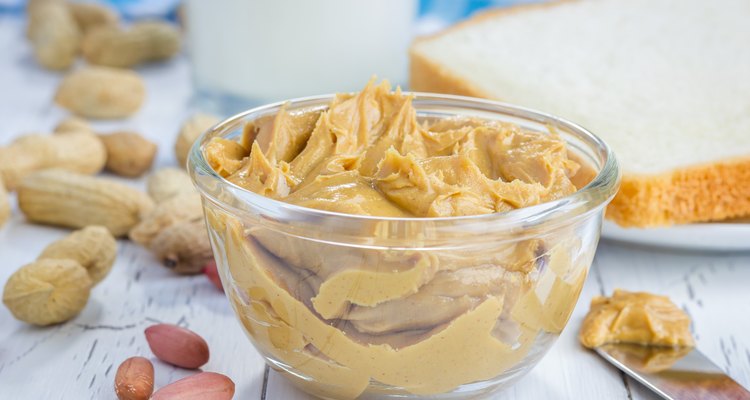
iuliia_n/iStock/Getty Images
Fresh ground peanut butter is made by grinding roasted and unsalted peanuts, often with some salt and a sweetener mixed in for taste. It contains large amounts of heart-healthy fats and essential nutrients.
Fresh Ground vs. Commercial Peanut Butter
Fresh ground peanut butter differs from commercial peanut butter in only a few ways. While commercially produced peanut butters contain either natural or artificial sweeteners and some salt -- usually in a proportion of about 7 percent sweetener and 1 percent salt by volume -- fresh ground peanut butters may contain neither of these or a smaller amount. Both, however, contain at least 90 percent pure ground peanuts by volume, a number that is required by law of products that advertise themselves as peanut butter. Both commercial and fresh ground peanut butters contain oil, but commercial butters include stabilizing agents to keep the oil emulsified into the product. Fresh ground peanut butters accumulate a thin layer of oil on the top of the mixture that must be mixed into the butter with each use. Nutritionally, fresh ground and commercial peanut butters are very similar.
Calories
Two Tbsp. of fresh ground peanut butter typically contains between 165 to 200 calories; about 73 percent of these -- approximately 140 calories -- are provided by fat, 10 percent by carbohydrates and 16 percent by protein. Because of the density of its caloric content, health professionals recommend holding your consumption of peanut butter to no more than one serving, or 2 Tbsp., daily. This amount is believed to be enough for you to yield the nutritional benefits of peanut butter without running the risk of taking in too many calories.
Fat
Fresh ground peanut butter contains between 14 to 18 g of fat per serving; this equates to 25 percent of your daily recommended intake of fat and 10 percent of your recommended intake of saturated fat. While that number may seem high, realize that 80 percent of that fat is monounsaturated and polyunsaturated, both types of fat that scientific studies, including one conducted at Purdue University, have found can lower triglyceride and blood cholesterol levels. In fact, the Health Castle site reports that the monounsaturated fat in peanut butter doesn't only lower overall cholesterol levels, it increases the HDL, or "good" cholesterol level while decreasing the "bad" LDL cholesterol amounts in the blood. Fresh ground peanut butter does not contain cholesterol.
Protein and Carbohydrates
Peanut butter that has been freshly ground provides an average of 7 g of carbohydrates and 7 g of protein for every two Tbsp serving. The carbohydrates in peanut butter are primarily in the form of dietary fiber: one serving contains 8 percent of your recommended daily intake of fiber. Fresh ground peanut butter contains 16 percent of the recommended amount of protein intake based on a typical 2,000-calorie-per-day diet.
Vitamins and Minerals
Peanut butter is rich in niacin, phosphorus, folate, Vitamin B6, thiamin, riboflavin, copper, zinc, potassium, magnesium, Vitamin E and iron. A single serving provides approximately 6 percent of your daily requirement of iron, 22 percent of Vitamin E, 24 percent of niacin, 15 percent of magnesium and 13 percent of phosphorus.
Related Articles
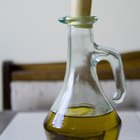
Organic Vs. Conventional Olive Oil

What Is the Difference Between Salt ...
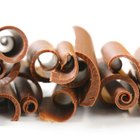
Cocoa Butter Nutrition

What Is Expeller Pressed Canola Oil?

Differences Between Roasted & Raw Nut ...
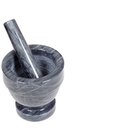
How to Finely Grind Celtic Sea Salt

Cooking With Salted vs. Unsalted Butter
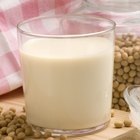
Is Soy Milk Casein-Free?

How to Make Salt Brine

How to Use Essential Oils Instead of ...

Public Vs. Confidential Marriage ...

What Is a First-Degree Relative?

About Fresh Ginger Substitutes

Substitutes for White Truffle Oil

Is Allantoin a Relative of the Lanolin ...

Calories in Peanut Brittle

How to Substitute Margarine for Butter ...

Difference Between Peppermint Extract & ...

What Are the Benefits of Extrapone ...

Can You Be Legally Separated and Live ...
References
Writer Bio
Michelle Kerns writes for a variety of print and online publications and specializes in literature and science topics. She has served as a book columnist since 2008 and is a member of the National Book Critics Circle. Kerns studied English literature and neurology at UC Davis.
Photo Credits
iuliia_n/iStock/Getty Images